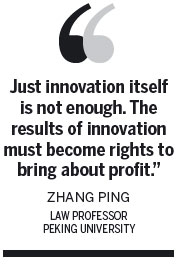As increasing numbers of Chinese companies expand into the global market, they need to improve their competence in facing intellectual property issues, said experts at a seminar held recently in Zhongguancun, Beijing's high-tech hub.
Zhang Zhicheng, an official from the State Intellectual Property Office, said at the seminar that international IP disputes involving Chinese companies are on the increase, both in traditional manufacturing and emerging sectors.
He said that one example is China's increasing share in all so-called Section 337 investigations in the United States, which focus on allegations of patent or trademark infringement.
From 2009 to June 2014, of the total 254 companies investigated by the US International Trade Commission, 72 were Chinese, including 17 of the 42 last year.
And the rate of unfavorable final rulings on Chinese companies was 60 percent compared to the global average of 26 percent.
"Many companies have failed to handle IP risks because they paid insufficient attention to global IP deployment during their overseas development," Zhang noted.
"For every $100 million worth of goods exported from China, there is only 0.4 patent on average, while in the US the number is dozens of times higher," he said.
But he noted the government has started making an effort to help domestic companies in their global expansion by building information sharing networks, refining overseas patent application protocols and improving capacity in IP analysis.
He also called for joint efforts from foreign companies.
As an innovation center in China, Zhongguancun in northwestern Beijing has experienced rapid global development, said Liu Hang from the administration of the area.
Last year 1,393 companies in the area generated exports with a combined value of $33.6 billion, for the first time surpassing the total volume from the rest of the city.
"The IP world has become a new battlefield for global competition, and companies from advanced economies, especially multinationals, are using their IP rights as weapons," said Liu, noting that international trade barriers are turning from tariffs and quotas to IP battles.
He suggested that companies be well aware of emerging IP issues and upgrade their strategies in overseas development, while the government should integrate resources, provide training, improve policies and introduce talent.
Zhang Ping, professor and executive vice-president of the School of Intellectual Property at Peking University, said China's current market competition is more intense than in 2008 when the national IP strategy was unveiled as the manufacturing-based industrial structure shifts to one based on innovation.
"But just innovation itself is not enough," she said. "The results of innovation must become rights to bring about profit."
She noted that the government policy had been unbalanced, focusing too much on quantitative growth in IP rather than quality.
"Global industry leaders, including some from China, do not have to turn every single one of their achievements into a patent," Zhang said. "Instead, they think about what combination or format to adopt to maximize their rights and benefits."
For an innovative company, the most valuable asset is a network of inventors, said Yan Sheng, director of Intellectual Ventures China. The US-based company focuses on buying patents and integrating them into a large patent portfolio and licensing them to third parties.
He suggested that a patent application be written in a way that it will lead to profit. "You have to make it clear who to defend against, who to cooperate with and who to rival."
Themed "intellectual property strategy with global vision", the seminar attracted about 300 delegates from local governments, research institutions, universities and companies.
An IP alliance for the information and communications technology and mobile Internet businesses was also unveiled at the seminar by 30 Zhongguancun-based companies and organizations.
zhangzhao@chinadaily.com.cn

